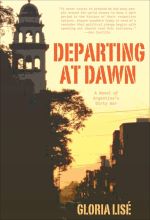I first learned of the Dirty War in college. My minor advisor was teaching a Latin American History course and was enthusiastic about having an English major/Gender Studies minor infiltrate the ranks of students who haunted the History department. There’s something to said for perspective and for context, I suppose, when it comes to both literature and history. History is never just facts, nor is literature ever just plot.
I remember the photo of the Mothers of the Plaza de Mayo in my textbook — white kerchiefs on their heads, the hand-painted signs that read niños desaparecidos above countless images of their disappeared children. It was one thing to read about the military junta’s civil rights violations, seizing Argentine citizens (an estimated 30,000 of them between 1976 and 1983) and disposing of them in all sorts of horrific ways. It’s another thing entirely to see the anguish painted across the faces of the very real people who didn’t know where their loved ones were or what had happened to them.
The novels gathered here offer various perspectives on this, one of the most traumatic eras in Argentina’s recent history. They feature parents whose children were taken from them, children whose parents helped to orchestrate atrocities, those who fled to survive, those who fought for their loved ones and their homeland. Each of their stories is arresting, diving into the messy complexities and emotional toll suffered by thousands of real families, not just the faceless number scribbled in a history book.

Hades, Argentina by Daniel Loedel
Hades, Argentina
by Daniel Loedel
Tomás Orilla fled Buenos Aries on an altered passport 10 years ago. Now, living as Thomas Shore and working as a translator in New York, he returns to his native Argentina to visit his mother’s dying friend, who happens to be the mother of Isabel, the woman whom he has been in love with for most of his life. Seeing her in the hospital stirs emotions and desires he hasn’t entertained since he last set foot on Argentine soil.
Isabel, who worked to undermine and dismantle the ruthless regime responsible for the Dirty War, recruited Tomás as a young medical student to spy on his benefactor. He is willing to do just about anything for her, but at what cost? Now, Tomás must confront the atrocities that haunt him in order to reconcile his past and present.
“An astonishingly powerful novel about the complex nature of guilt,” praises author Colm Tóibín. “It sets the personal against the political with real emotional accuracy and sharp narrative skill.” This debut was inspired by the author’s own sister who was disappeared by Argentina’s military dictatorship in 1978 and whose remains were only recently recovered; the book is dedicated to her.

Perla by Carolina De Robertis
Perla
by Carolina De Robertis
A young university student, Perla, returns home while her parents are away to find a naked stranger, dripping briny seawater. With no evidence to suggest how he gained entry, it appears as if he just materialized in her parents’ living room. Despite her shock, Perla cares for the man and soon learns that he is an apparition of one of the disappeared.
This strange occurrence may hold answers about the extent of her father’s involvement in the Dirty War. After years spent tight-lipped about his naval career, she can no longer remain willfully ignorant of his actions on behalf of Argentina’s military dictatorship. Although she’s always been proud of her family and loved her father dearly, learning the truth of the atrocities he played a part in could change everything.
The novel questions our propensity to hold children accountable for the sins of their parents, just as we hold younger generations accountable for the ills of past generations. “De Robertis brings the best of two cultures to bear in her work, melding the Latin literary tradition of magical realism with a thoroughly modern, politically charged North American sensibility,” writes the Chicago Tribune. “[Her] extraordinary gift makes this brave, important book an object of beauty.”

The Confessional by Claudia Ermey
The Confessional
by Claudia Ermey
Mirta and Alberto DeSalvo’s lives were upended by Argentina’s Dirty War. Their family vanishes before their eyes; their daughter and granddaughter abducted by the military because of Alberto’s atheism and left-wing ideals, joining the somber ranks of the “disappeared.” Although grief weighs heavy on them both, Mirta hopes that they might have spared her only grandchild, entrusting the infant to a more conservative family, and vows to find her someday.
Two years later, the DeSalvos are living in California, working on the estate of the wealthy woman who helped them flee Argentina. When their benefactor, Julia, learns she’s pregnant, she knows she cannot raise the child and asks the DeSalvos to adopt Francesca. They agree, but Julia begs them not to return home until Francesca is grown, meaning Mirta’s quest to find her lost grandchild must wait.
Partially inspired by the author’s travels to Buenos Aires — where the Mothers of the Plaza de Mayo still march, demanding to know the fate of their “disappeared” children — author Judy Bernstein calls The Confessional “a compelling rendering of how war and love thousands of miles apart create trauma that ripples through two generations and emerges as love, understanding and forgiveness.” (Our review.)

The Ministry of Special Cases by Nathan Englander
The Ministry of Special Cases
by Nathan Englander
The Ministry of Special Cases focuses on a Jewish community in Buenos Aries. The protagonist, Kaddish Poznan, earns a living by erasing names from headstones in the cemetery for the disgraced on behalf of family members who want to shield themselves from further shame. The son of a prostitute, Kaddish has lived as an outcast both within his small religious community and the world outside it. Even Kaddish’s own son, Pato, refuses to accept him.
Of course, as tenuous as that relationship may be, Kaddish and his wife, Lilian, are devastated when Argentina’s military junta kidnaps 19-year-old Pato. Their valiant search brings them to a ministry for “special cases” where their desperate hope of finding their son is met with cold and clinical bureaucracy.
While The Confessional, a previous entry on this list, centers on the relationships between mothers and daughters, this novel centers on fathers and sons. “An amazing amalgam of wit and heart-stopping suspense,” notes Nora Ephron of The New York Times Book Review, “the plot doesn’t begin to convey what Englander manages to do with Argentina in the time of the Disappeared.”

Departing at Dawn by Gloria Lisé
Departing at Dawn
by Gloria Lisé, translated by Alice Weldon
Berta, a young medical school student, watches in horror as soldiers throw her lover, a union organizer named Alito, to his death from a balcony window and into the city square. Believing Alito had money set aside, the government turns its attention to Berta who they think is in possession of, or at least knows where to find, Alito’s cash. To survive, she must flee her family and her life in the city.
She takes refuge in the countryside with distant relatives who may as well be strangers to her, but just as she begins to build new bonds, finding brief moments of peace after having left so much violence behind her, she discovers other misdeeds for which her own family is responsible.
“In an extremely well-crafted first novel,” writes one reviewer, “Gloria Lisé has put a human face on the story of 30,000 ‘disappeared’ people … she manages to show the impact that the government’s hunting of dissenters has on one family and … the human toll that numbers cannot reflect.”

Imagining Argentina by Lawrence Thornton
Imagining Argentina
by Lawrence Thornton
It only feels appropriate to end this list with another book that dips its toe into the Latin American literary tradition of magical realism. Carlos Rueda, a children’s theatre director, learns of his ability to divine the fate of the disappeared after the Argentine government takes his outspoken wife, Cecilia. To know if a disappeared person will return or if they were one of many disposed of in unspeakable ways, all Carlos has to do is think of them.
Compelled to provide closure, even if it’s an unpleasant truth, to the families seeking answers about their loved ones, Carlos holds weekly meetings for his community. But his gift, as incredible as it may be, cannot give him answers about his own wife’s fate, driving Carlos to near madness.
Nominated for the PEN/Faulkner Award for Fiction and adapted for film in 2003, Los Angels Times calls Imagining Argentina “remarkable” and “deeply inventive … Thorton has imagined Argentina truly; his inspired fable troubles and feeds our own intriguing imagining.”




